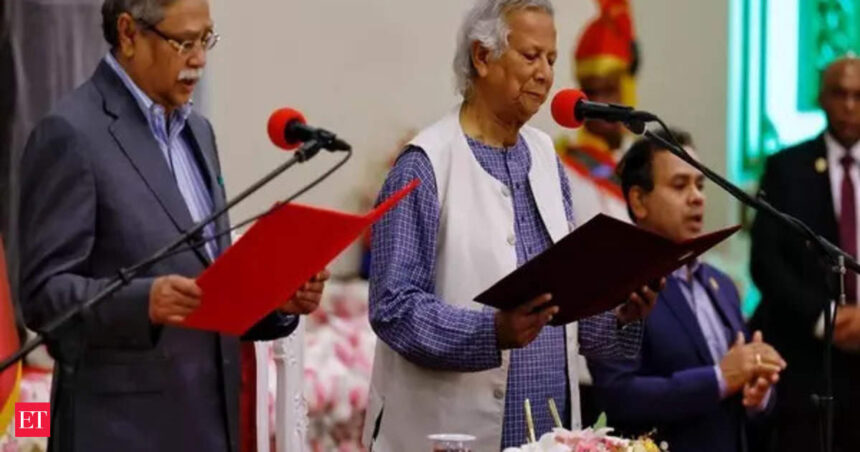Yunus, who won the 2006 Nobel Peace Prize for his pioneering microfinance work, has taken on a super portfolio that includes transport, land, defence, aviation and energy.
His cabinet, which began work on Friday, has been given the official title of adviser, not minister.
These are the men and women tasked with steering democratic reforms after the end of Hasina’s 15-year autocracy.
-The students-
Sociology graduate Nahid Islam, 26, who is in charge of the telecommunications ministry, is credited with leading the student movement that protested in July against civil service job quotas that Hasina quickly withdrew.
Last month he was forced out of a hospital in Dhaka and abducted by plainclothes police. They tried to force him to call off the protest before releasing him a few days later. group campaign and will be the responsibility of the sports ministry.
– Central Bank –
In charge of the finance ministry is Saleh Uddin Ahmed, a respected central bank governor during the 2001-06 government led by Hasina’s main rival, the Bangladesh Nationalist Party (BNP).
Now in his early 70s, Ahmed is known for his fiscal prudence and aggressive use of monetary tools to fight inflation.
After his retirement, he became a vocal critic of Hasina’s economic policies and her ties to powerful oligarchs with commanding positions in Bangladesh’s economy.
– Human Rights Activist –
In the industry ministry, Adilur Rahman Khan, 64, is a Bangladeshi human rights activist who served as deputy attorney general during the last BNP government.
A group founded in the 1990s — Odhikar, meaning “Right” — documented thousands of extrajudicial killings under Hasina’s government before her government banned them last year.
Khan was convicted of spreading false information in court that observers condemned as politically motivated.
Electoral reform activist Sharmeen Murshid, who has criticized the conduct of national polls that brought Hasina to power, will head the social affairs ministry.
Farida Akhter, founder of the Women’s Resource Center campaign group, took the fisheries and livestock portfolio.
-The writers-
Foreign affairs will be handled by Touhid Hossain, in his late 70s, who had a long career as a diplomat before becoming a columnist for the largest Bengali language daily prothom Alo.
Nazrul Islam, 61, a law professor at Dhaka University, and one of Hasina’s most strident opponents among academics, took charge of the justice ministry.
Both men are known for their pro-Western views and criticism of Bangladesh’s relations with India, a strong supporter of the Hasina regime.
– Environmental campaign –
The person responsible for climate change is Syeda Rizwana Hasan, a top environmental lawyer who fights against industrial interests that pollute the country’s river channels and illegally dump toxic waste.
Her husband was abducted in 2014 by the notorious Rapid Action Battalion (RAB) police force, accused of numerous rights violations.
He was released a few days after public outcry.
– General-
Sakhawat Hossain, a former army brigadier general who used to be close to Hasina’s Awami League, will be in charge of home affairs.
He called for a more interventionist role on issues related to Rohingya refugees fleeing to Bangladesh from neighboring Myanmar, calling for greater engagement with rebel groups fighting the country’s junta.
Hossain openly supported the student movement last month, putting pressure on officers not to attack protesters – a decision that eventually forced Hasina to resign.
-The rest-
Psychiatrist Bidhan Ranjan Roy is the lone member of Bangladesh’s minority Hindu community, while former diplomat Supradip Chakma represents the indigenous people of the Chittagong Hill Tracts.
Faruk-e-Azam fought in the independence war of Bangladesh in 1971, winning awards for bravery.
Local government affairs went to Hassan Ariff who was the former attorney general in the last BNP government.
Nurjahan Begum, who worked with Yunus at the microfinance lender Grameen Bank, will be in charge of the country’s health affairs.
Khalid Hossain, meanwhile, a former professor of Islamic Studies in Chittagong, will be in charge of religious affairs — reportedly on the recommendation of Islamic groups.




